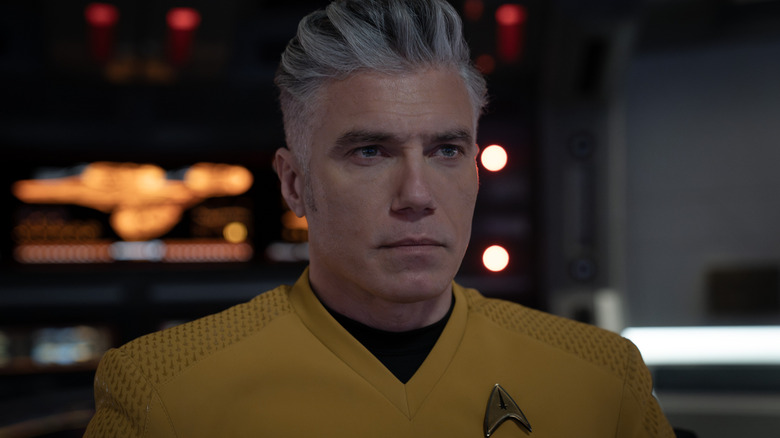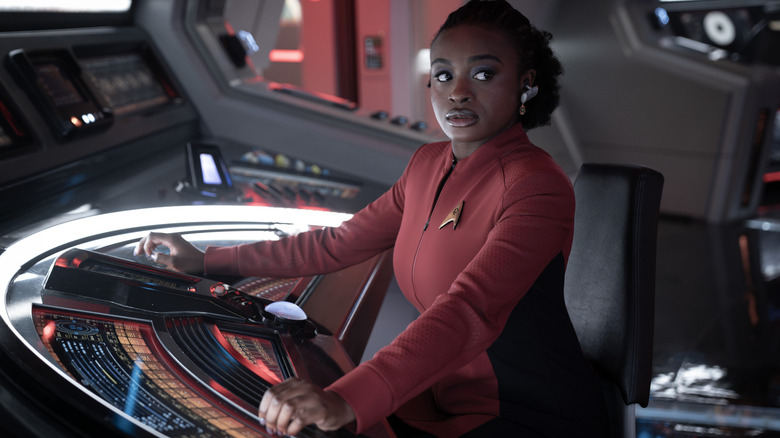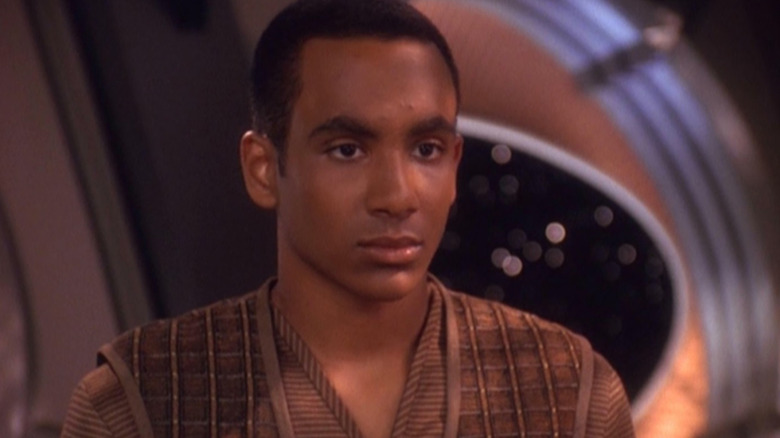Strange New Worlds Season 3 Directly Tackles Star Trek's Biggest Contradiction
Security alert! This article contains spoilers for season 3, episode 7 of "Star Trek: Strange New Worlds."
When "Star Trek" creator Gene Roddenberry first set forth his vision for his seminal science fiction series, he wanted it set in a future where Earth had become a truly utopian society. In fact, he initially had a "no conflict" rule that made writing "Star Trek" episodes especially challenging under his watch. Starfleet, the exploration and peacekeeping arm of the United Federation of Planets, is supposed to be nigh flawless with impeccable moral standards that clearly fall in line with Earth's commitment to an egalitarian, pacifist society. Unfortunately, not everyone in the vast reaches of space is as keen on following the rules as Starfleet, which can make diplomacy a bit complicated.
Despite having numerous spin-offs and stories in the franchise, Starfleet only occasionally gets put under any real scrutiny, and that's kind of a shame. Blindly accepting that Starfleet are the good guys at all times, save for the occasional dodgy Admiral, just isn't truly in line with the overall ethos of "Star Trek" even if it made Roddenberry feel warm and fuzzy. It's when we see the cracks in Starfleet and how the individual officers deal with those moral contradictions that we get to see real heroism.
In the "Star Trek: Strange New Worlds" episode "What is Starfleet?," young documentarian Humberto "Beto" Ortegas (Mynor Lüken) is aboard the Enterprise both annoying his sister Erica (Melissa Navia) and making a documentary about Starfleet when the crew is tasked with a very unusual transport mission that forces many of them to actually question their orders. With Beto's cameras watching their every move and his probing questions challenging their intentions, the crew of the Enterprise are forced to come face-to-face with one of the franchise's biggest contradictions.
It's people that make Starfleet great, and not the other way around
In "What is Starfleet?" the Enterprise are tasked with helping transport an alien being from its home planet on Tychus-B to a Lutani-7, a non-Federation world at war. The alien is the size of a starship and has to be pulled with a tractor beam, but when it starts to rebel against its bindings, the crew start really questioning why they're relocating the creature. Beto probes them at every turn, discovering that not only are the Lutani the aggressors in the war, but the creature the Enterprise is supposed to relocate has been made into a living weapon. It might just be me, but I'm pretty sure that delivering (living!) weapons of mass destruction to war criminals might make Starfleet the bad guys here. (It's also a little on-the-nose as far as U.S. military allegories go, but I digress.)
It takes a lot of Beto's probing and quite a bit of suffering on the creature's part before certain members of the crew stop blindly following orders and start actually doing the right thing. Though characters who otherwise seemed morally upstanding have some pretty disappointing moments where they simply shut down any questions with "it's classified," others are clearly changed and will be more potentially critical of Starfleet in the future. Since legacy characters like Kirk (Paul Wesley) will absolutely go on to challenge Starfleet in the future, it only feels right.
In the end Beto concludes that the real value of Starfleet isn't Starfleet itself, but the individual people who make up the organization. Sure, Starfleet may have helped them hone their skills and get incredible experiences, but in return they make Starfleet great. Without officers willing to challenge orders and the status quo, Starfleet cannot survive and actually stand for the ideals it claims to represent.
The journalists that help hold Starfleet accountable
The episode is shot faux-documentary style in a mix of still surveillance cameras, drone footage, and interviews Beto conducted with the crew in the same vein as one of the greatest "M*A*S*H" episodes of all time, and it doesn't quite work as a format. "Strange New Worlds" has been playing with genres and formats so much that it's become a little disorienting, and "What is Starfleet?" is only the latest example. Despite the format, Beto's probing questions and journalistic voice are important. Journalists are sometimes villainized in the real world for being buzzkills or taking heroes down a peg by calling out their faults, but it's vital to hold powerful entities accountable no matter what our personal biases might be. Beto's documentary probably goes a little softer on Starfleet than it would have if his sister wasn't the Enterprise's crack pilot, but it still calls into question Starfleet's motives and potential corruptibility. Starfleet is essentially the military arm of the Federation, for better and worse, and that means getting their hands dirty.
Another "Star Trek" series that occasionally challenged Starfleet's infallibility and questioned its military status was "Star Trek: Deep Space Nine." Captain Benjamin Sisko (Avery Brooks) wasn't afraid to use subversive methods to gain the upper hand in war and even questioned Starfleet himself, but his son, Jake (Cirroc Lofton), was a journalist who had some genuine criticisms of Starfleet. Jake poked at Starfleet rules and regulations and questioned his father's motives, giving the audience the chance to do so as well. Though both Beto and Jake are just young, flawed journalists doing their best to hold a massive organization accountable, they're reminders of why good journalism matters.


